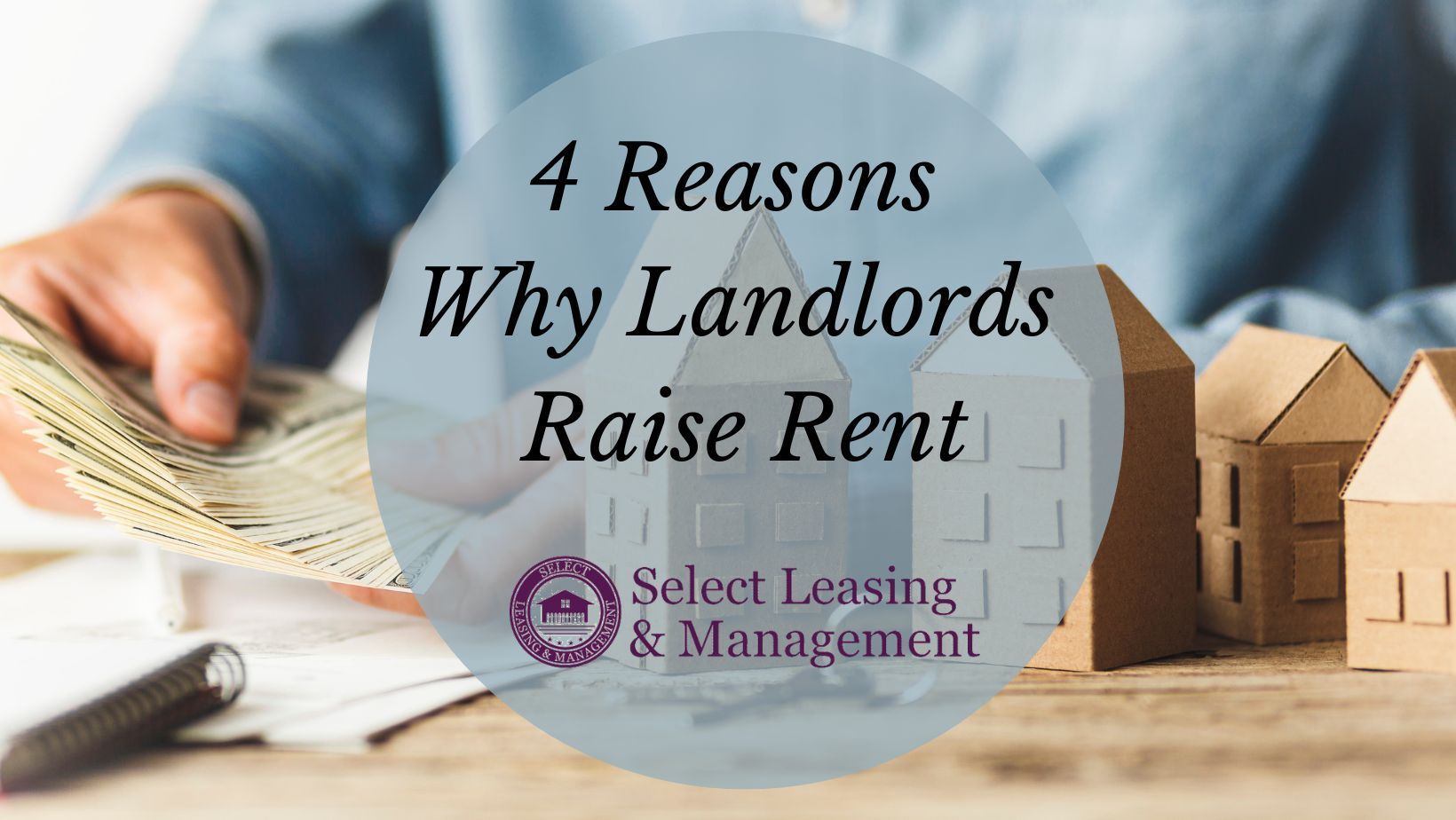4 Reasons Why Landlords Raise Rent

Top (Legitimate) Reasons Landlords Raise Rent
Tenants may be unhappy or even angry when the rent goes up, but it is important to remember that owning rental property is a business. And while landlords obviously want to make money, they rarely raise the rent just to increase their profits. There are a number of reasons why they
must raise rent to keep their business afloat. Here are the 4 most common:
1. Increase in Expenses
No one is immune from the pinch of higher prices. Everyone feels it with each trip to the grocery store and gas station. The costs “behind the scenes” in a rented house or apartment go up, too. Taxes and insurance on the building might rise. So will the labor and materials necessary to fix things and do normal maintenance. As with any business,
property owners do what they can to keep costs under control, but they have certain margins of profit they hope to make. In some cases it is a choice between raising rent and letting the property’s upkeep slide—something that tenants and landlords can both agree is not a good idea.
2. Renovations or New Amenities
At some point, every building will need a new roof, new HVAC, or replacement windows. The rental units will need to be updated periodically too. New appliances, countertops, or flooring will keep the apartment fresh and a desirable place to live. Or, a landlord might decide to add a major new amenity for the tenants’ benefit like a pool or workout room.
All of these things can improve the renters’ daily lives. Changes like these will also help keep the property competitive with others in the market. Good landlords are continually looking for ways to make their properties better, and quite often the only way to raise the money to pay for them is to increase the rent.
3. Improvements in the Local Market
You may have heard the phrase “a rising tide lifts all boats.” When a neighborhood improves, so does the prospect of living there. And when an area suddenly becomes desirable, rent amounts rise too.
When new businesses move into a neighborhood, or if a school, library, park, or other community-friendly place is built, people are more likely to want to live there. A large employer building a location nearby or the addition of public transportation routes can have the same effect.
It’s simple economics: Increased demand for rental units will drive prices up. Landlords need to review what comparable apartments are going for to set their prices. An up-and-coming area is almost certain to see a bump in rent. Tenants who are unhappy about the increase will see that they won’t necessarily find anything cheaper in the same location.
Market demand for certain types of dwellings can cause an increase in rent as well. For example, a landlord might leave the rent the same for two-bedroom units but raise rent for one-bedroom units if for some reason there are more people seeking them out.
4. Adjusting to Overall Market Demand
Supply and demand doesn’t just have an impact at the local level. An increase or decrease in renters nationwide will also affect rental prices. The St. Louis Realtors’ housing report for August 2021 showed that many would-be homeowners are sticking with renting for the time being. Many of them have been able to find homes for sale in their price range, and those that are affordable are snatched up quickly.
Smart landlords keep an eye on these market trends and in response, raise rent on their investment properties. The national median rent increased by 11.4% in the first half of 2021. This is unfortunate for renters who are saving up to buy a house, but until something changes in the overall housing market, rent increases might be unavoidable.
Raising Rent the Right Way

When a landlord decides it is the right time to raise rent, it is important to do it in the right way.
Depending on the state or municipality, there could be strict guidelines about how to manage a rent increase. In general, landlords cannot raise rent until the end of the lease agreement. How much notice a tenant should have, or the percentage increase allowed at one time, can vary from place to place. Fair housing laws prohibit discrimination, so landlords can not, for example, favor some tenants while raising rent for others in the same type of apartment, nor raise rent simply to force some people out.
One thing that renters (and many landlords) do not realize is that when rent goes up, security deposits will need to increase in lock step. Security deposits are usually based on the monthly rental amount; if rent goes up from $1000 to $1100, a security deposit of first and last month’s rent will trigger a request for an additional $200 to take the security deposit from $2000 to $2200.
How to raise rent in accordance with the law is something that all landlords must know. Owners who choose to hire a leasing and management company such as Select Leasing & Management can avoid much of the hassle, as well as dealing with potentially unhappy tenants.
Rent increases might be initiated by the owner, or suggested by their management company based on their monitoring the local market. Either way, a property management company can not raise rent without the landlord’s approval, unless it is written into their contract.
Avoiding the Hassles of Raising Rent
The best way to avoid the issues that come along with rent increases is mentioned above: Hire a property management company. Aside from that, we have some additional recommendations to feel less resistance to a necessary rent increase:
- Eliminate confusion by putting information about the increase and new terms of the lease in writing.
- Give the proper amount of notice. This may vary depending on the location, but in general, month-to-month leases require 30-days notice. Longer leases should have the timeframe written into the lease agreement. If possible, landlords can consider giving even more notice than is required. This gives tenants more time to budget for the increase. If they must move out, it gives them additional time to search for a new home.
- Instead of a huge jump every few years, consider incremental increases every year. These may be easier for tenants to manage.
- If the increase is tied to higher costs or new amenities, share that information. The tenants will be less likely to be upset if they understand that there is a good reason behind it.
Remind tenants as the time of the increase approaches, but be understanding if they forget the first time. They may be in the habit of writing a check for the old amount or have forgotten to update their autopay information at the bank. Giving them a gentle reminder is better for the landlord/tenant relationship than getting angry.
Is it Time to Raise Rent?
When it is time to raise rent, it does not have to be unpleasant. Most tenants realize that rent increases are sometimes necessary. When landlords have a valid reason and approach the situation with professionalism and understanding, they are more likely to get cooperation and retain their good tenants.
Cover Image by Andrii Zastrozhnov by Canva.com
Share this post










